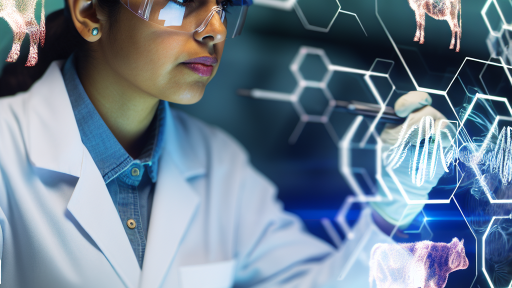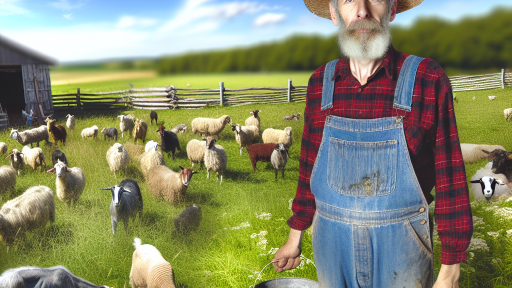Understanding the Unique Needs of Exotic Livestock
Recognizing Specific Needs
Exotic livestock have distinct requirements compared to traditional farm animals.
It is essential to understand their natural habitats and behaviors.
Each species may require tailored care to thrive.
Creating an Optimal Environment
Providing the right habitat is crucial for exotic livestock well-being.
Consider factors such as space, temperature, and humidity.
Ensure the environment mimics their natural conditions.
Moreover, include enrichment to encourage natural behaviors.
Nutritional Requirements
Proper nutrition is vital for exotic livestock health.
Research each species’ dietary needs thoroughly.
Specialized diets may be necessary for optimal growth and reproduction.
Incorporate a variety of nutrients and supplements as required.
Health Monitoring and Veterinary Care
Regular health check-ups help catch potential issues early.
Partner with a veterinarian experienced in exotic animals.
Vaccinations and preventive care programs should be established.
Track vital signs and behaviors for early problem detection.
Transform Your Agribusiness
Unlock your farm's potential with expert advice tailored to your needs. Get actionable steps that drive real results.
Get StartedHandling and Behavior Management
Understanding animal behavior aids in effective handling.
Observe species-specific temperaments to develop trust.
Gentle handling reduces stress during interactions.
Legal Considerations
Familiarize yourself with laws regarding exotic livestock ownership.
Some species may require special permits or licenses.
Always prioritize animal welfare and ethical treatment.
Creating a Suitable Habitat for Exotic Animals
Understanding Habitat Requirements
Different exotic animals have specific habitat needs.
Research each species to understand their natural environment.
Consider temperature, humidity, and space requirements for each animal.
Establishing a Controlled Environment
Use enclosures that mimic the animal’s natural habitat.
Include environmental controls like heating and cooling systems.
Install proper ventilation to maintain air quality.
Providing Enrichment
Exotic animals need mental and physical stimulation.
Include items like climbing structures, tunnels, and hiding spots.
Rotate enrichment items to keep the environment interesting.
Maintaining Hygiene
Regular cleaning is essential for animal health.
Establish a cleaning schedule based on the habitat’s needs.
Use safe cleaning products that won’t harm the animals.
Regular Monitoring of Conditions
Frequently check temperature and humidity levels.
Use reliable thermometers and hygrometers for accurate measurements.
Adjust conditions as necessary to ensure animal comfort.
Providing Space for Movement
Ensure the enclosure is spacious enough for the animal’s needs.
Consider walking and flying space for different species.
Provide areas for both activity and rest.
Showcase Your Farming Business
Publish your professional farming services profile on our blog for a one-time fee of $200 and reach a dedicated audience of farmers and agribusiness owners.
Publish Your ProfileDietary Requirements: Nutrition for Exotic Species
Understanding Nutritional Needs
Exotic livestock have unique dietary requirements.
Understanding these needs is essential for their health.
Different species require different nutrients.
Consulting a veterinarian is advisable for tailored diets.
Essential Nutrients for Exotic Livestock
Proteins are vital for growth and tissue repair.
Fats provide energy and support cell structure.
Carbohydrates offer quick energy sources.
Vitamins and minerals ensure proper metabolic functions.
Feeding Strategies
Offering a varied diet improves nutritional balance.
Incorporate fresh fruits and vegetables regularly.
Consider supplements for specific dietary gaps.
Monitor the livestock for any signs of dietary deficiencies.
Importance of Hydration
Water is equally crucial for all livestock species.
Ensure clean, fresh water is always available.
Monitor water intake to prevent dehydration.
Disease transmission can occur through dirty water sources.
Adjusting Diets with Life Stages
Diet needs vary across different life stages.
Young animals require more protein for growth.
Breeding animals may need specific nutrients for reproduction.
Seniors often benefit from easy-to-digest foods.
Observation and Adjustment
Regularly observe your livestock’s behavior and health.
Changes in appetite may signal nutritional issues.
Adjust diets as needed for optimal health.
Always consult professionals when making significant changes.
Gain More Insights: Optimizing Livestock Transport for Farm Efficiency
Health Care: Preventive Measures and Regular Check-Ups
Understanding Preventive Care
Preventive care is crucial for exotic livestock health.
This approach helps in identifying potential issues early.
Regular check-ups can significantly reduce health risks.
Vaccinations are essential for protecting against diseases.
Moreover, proper nutrition supports their immune systems.
Always source feed that meets specific dietary needs.
Consider consulting a veterinarian familiar with exotic species.
Creating a Schedule for Check-Ups
Establish a regular schedule for health check-ups.
Frequency of visits may vary based on the species.
Some animals may require quarterly visits.
Others may do well with biannual check-ups.
Document all visits and observations for future reference.
This information can assist veterinarians in assessing trends.
Recognizing Signs of Illness
Pay attention to any unusual behavior in your livestock.
Common signs of illness include lethargy and poor appetite.
Showcase Your Farming Business
Publish your professional farming services profile on our blog for a one-time fee of $200 and reach a dedicated audience of farmers and agribusiness owners.
Publish Your ProfileLook for physical symptoms like unusual discharge or swelling.
Monitor weight changes regularly to identify potential problems.
Taking prompt action can lead to better recovery outcomes.
Environment and Stress Management
A suitable environment minimizes stress-related illnesses.
Ensure adequate space for movement and social interaction.
Regularly clean living quarters to prevent infections.
Provide enrichment to stimulate mental well-being.
This step can greatly enhance the quality of life for livestock.
Emergency Preparedness
Develop an emergency plan for potential health crises.
Have contact information for local veterinarians readily available.
Ensure all necessary medications and supplies are stocked.
Being prepared can save valuable time during an emergency.
Regular drills can help you and your team remain ready.
See Related Content: Selecting the Right Breeds for Your Farm
Behavioral Considerations: Socialization and Enrichment
Understanding Socialization Needs
Socialization is crucial for exotic livestock.
These animals thrive when interacting with others of their kind.
Therefore, understand their species-specific behaviors thoroughly.
Moreover, observe how they interact within groups.
Each species has different social structures.
For instance, some prefer solitude while others seek company.
Creating an Enriching Environment
An enriching habitat fosters mental stimulation.
Include various physical structures for climbing or hiding.
Additionally, provide toys to keep them engaged.
Rotate these items regularly to maintain novelty.
Observations show that stimulation reduces stress levels.
Incorporating Interaction
Regular human interaction is essential.
Approach them calmly to build trust and rapport.
Engage in gentle activities like feeding or petting.
Group activities also help reinforce social bonds.
Use positive reinforcement to encourage desired behaviors.
Monitoring Behavioral Changes
Always observe behavioral changes closely.
Signs of stress may include excessive vocalizations or hiding.
Changes may indicate that something in their environment requires adjustment.
Thus, maintaining a keen eye supports their welfare.
Keeping Records of Behavioral Patterns
Keep detailed records of their behaviors over time.
This information assists in understanding their needs better.
With records, adjustments can be made based on observed patterns.
Ultimately, this leads to healthier, happier animals.
Gain More Insights: Optimizing Breeding Cycles for Maximum Efficiency

Legal and Regulatory Considerations for Exotic Animal Ownership
Understanding Local Laws
Every region has specific laws concerning exotic animal ownership.
Showcase Your Farming Business
Publish your professional farming services profile on our blog for a one-time fee of $200 and reach a dedicated audience of farmers and agribusiness owners.
Publish Your ProfileIt is crucial to research the regulations in your area.
Cities and states may have different guidelines regarding species allowed.
Check with local wildlife agencies for detailed information.
Permits and Licensing
Many jurisdictions require permits for exotic animal ownership.
Application processes can vary greatly between locations.
Therefore, you must gather the necessary documentation before applying.
Fees may also apply, depending on your region’s regulations.
Welfare Standards
Compliance with welfare standards is essential for exotic animals.
Regulatory bodies often outline specific care guidelines.
These guidelines include proper housing, nutrition, and medical care.
Noncompliance can lead to penalties or confiscation of animals.
Import and Export Regulations
Importing exotic animals involves strict regulations.
Many countries require permits for both import and export.
Familiarize yourself with CITES regulations to avoid legal issues.
Illegal trafficking can result in severe consequences.
Insurance Considerations
Consider obtaining liability insurance for exotic animals.
This coverage can protect you from unexpected incidents.
Insurance providers may have specific policies for exotic livestock.
Reviewing options thoroughly can safeguard your investment.
Connection with Professional Communities
Engage with communities focused on exotic animal ownership.
These networks provide valuable insights on legalities and best practices.
You can learn from experienced owners and professionals.
Such connections can also offer support in emergencies.
Learn More: Optimizing Water Quality in Fish Farming Environments
Emergency Preparedness: Handling Crises in Exotic Farming
Importance of Planning
Emergency preparedness is crucial for exotic farmers.
Proper planning helps manage potential crises effectively.
In fact, it can significantly reduce loss and stress.
Identifying Potential Risks
Begin by assessing possible threats to your farm.
Natural disasters like floods and droughts are common risks.
Additionally, consider potential disease outbreaks among livestock.
Lastly, theft or vandalism can also pose serious threats.
Creating an Emergency Plan
Your emergency plan should be thorough and actionable.
Start by establishing clear communication channels.
This ensures everyone knows their roles during a crisis.
Next, detail procedures for protecting livestock and facilities.
Moreover, include a list of emergency contacts for quick access.
Training and Drills
Regular training is essential for all farm workers.
Conduct drills to practice emergency response actions.
This builds confidence and improves response times during actual crises.
Furthermore, update training materials to reflect any changes in procedures.
Showcase Your Farming Business
Publish your professional farming services profile on our blog for a one-time fee of $200 and reach a dedicated audience of farmers and agribusiness owners.
Publish Your ProfileStocking Emergency Supplies
Maintain an inventory of essential emergency supplies.
First aid kits and medical supplies should be a priority.
Also, stock non-perishable food and water for your animals.
Consider having backup feed and bedding materials available.
Establishing a Response Team
A dedicated response team can manage an emergency efficiently.
This team should include skilled individuals familiar with livestock care.
Additionally, assign specific roles to team members based on expertise.
Regular Review and Updates
Continuously review your emergency plan and procedures.
Update them as necessary to reflect new risks or changes in operations.
Moreover, gather feedback from team members after drills.
This input is valuable for improving your emergency response plan.
Sustainability Practices for Maintaining Exotic Livestock
Understanding the Benefits
Implementing sustainable practices offers numerous advantages for exotic livestock care.
Firstly, it promotes the overall health of the animals.
Secondly, it reduces environmental impact significantly.
Moreover, sustainable methods ensure long-term viability for livestock farming.
Choosing Sustainable Feed Options
Selecting high-quality, sustainable feed is crucial for exotic livestock.
Opt for locally sourced ingredients whenever possible.
This choice reduces transportation emissions and supports local farmers.
Furthermore, look for organic or non-GMO feed to enhance nutrition.
Water Conservation Techniques
Efficient water usage plays a vital role in sustainable livestock care.
Employ rainwater harvesting systems to collect and utilize precipitation.
Additionally, consider installing water-efficient watering systems.
This can help reduce waste and ensure consistent water availability.
Ecological Habitat Management
Creating natural habitats significantly benefits exotic livestock.
Design enclosures that mimic the animals’ natural environments.
Incorporate native plants to enhance biodiversity in the area.
Moreover, ensure proper waste management to maintain habitat health.
Promoting Biodiversity
Integrating various livestock species fosters a balanced ecosystem.
This practice encourages stability and resilience in the farming environment.
Furthermore, diverse species can help control pests naturally.
Monitoring and Record-Keeping
Establish a robust monitoring system for livestock health and farm practices.
Regularly assess animal well-being to identify potential issues early.
Additionally, maintain detailed records to track sustainability efforts.
These records can aid in refining future practices and approaches.
Additional Resources
Guide for the Care and Use of Laboratory Animals, 8th edition …




